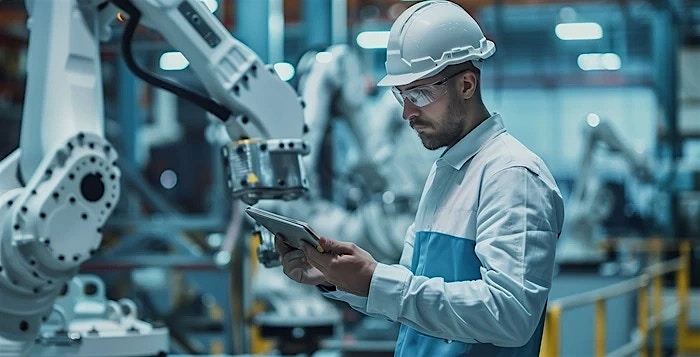For too long, manufacturers have been led astray by the simple notion that merely adding more automation and digital tools will magically transform their operations. The data tells a compelling story. As technology investments have grown to 30% of operating budgets in 2024, many manufacturers still grapple with fundamental technology integration challenges. This "cookie-cutter" approach, driven by a fear of missing out and vendor hype, has resulted in a patchwork of disconnected technologies, failing to deliver the promised revolution.
The truth is more complex and demands a fundamental shift in perspective. The future of manufacturing isn't about mere digitization; it's about orchestrating a symphony of converging technologies to create intelligent, adaptive industrial ecosystems. We're moving beyond Industry 4.0 hype toward a tangible "industrial consciousness" — a seamless fusion of the physical and digital, best described as the industrial metaverse.
This isn't science fiction; it's the era of new reality unfolding. AI-powered simulations tend to optimize production before a single part is made and immersive virtual environments now train workers in perfect replicas of their physical workplaces. This convergence is reshaping companies through:
- Rapid product innovation: Virtual prototyping shortens R&D cycles, enabling swift customization
- Agile, self-optimizing production: Real-time adjustments minimize downtime and respond dynamically to fluctuating demand
- Resilient supply chains: End-to-end visibility reduces inventory costs and mitigates geopolitical or logistical disruptions
- New revenue streams: Connected products enable outcome-based services like predictive maintenance subscriptions
The digital investments of the future demands a truly interoperable industrial ecosystem. Augmented reality, virtual reality, digital twins and spatial computing are now converging to create an intelligent "nervous system" that learns, adapts and evolves.
Laying the foundation for the industrial metaverse
Building this future requires a robust technological architecture grounded in proven technologies and fortified by forward-thinking layers:
- IIoT as the operational backbone: IIoT has evolved from simple connectivity to the core operating system of modern manufacturing. The resurgence in IoT is witnessing over 40 billion connected IoT devices being adopted by 2030
- Digital twins for real-world insights: Digital twins empower manufacturers to simulate and optimize processes, driving significant improvements in supply chain responsiveness and production efficiency
- Intelligent systems integration: Advanced AI/ML platforms enable predictive maintenance, quality control and smart factory operations, significantly reducing defects and downtime
These technologies, when harmonized, create environments where real-time intelligence and autonomous optimization are the norm, transforming every aspect of the value chain:
- GenAI-accelerated design: GenAI speeds up ideation, while digital twins validate designs against real-world constraints
- AI-driven production: IIoT sensors and AI analytics predict equipment failures, minimizing costly downtime
- Autonomous logistics: AGVs and blockchain-tracked shipments streamline logistics and reduce lead times
- Enhanced customer service: AR-enabled remote assistance improves first-time fix rates, boosting customer satisfaction and service revenue
Technology leaders must recognize the potential of the industrial metaverse and invest in building incremental value in this space. At HCLTech, our Metaverse solution is well-positioned as a comprehensive, cross-functional platform that not only bridges the gap between current digital capacities and the potential of the metaverse but also sets the stage for organizations to radically transform user interactions and digital operations.
Navigating the complexities of implementation
While the technological foundation is crucial, manufacturers must also address challenges like rising costs, skills gaps and geopolitical instability. The future of manufacturing is increasingly getting software-driven and demands:
- Seamless connectivity: Uninterrupted data flow across all factory elements
- Model-based enterprise adoption: Embracing digital thread implementation for enhanced efficiency
- XR and AI integration: Investing in XR and AI/ML for process optimization and faster decision-making
- Smart factory development: Driving operational improvements through predictive operations, adaptive production and AI-powered quality control
lifecycle management for enterprises
Embracing the next era of manufacturing
The intelligent factory is no longer a distant vision; it's the benchmark for the next wave of industrial production. Thriving in this post-industrial era demands more than just readiness; it requires a bold, holistic approach.
Companies must move beyond incremental improvements and embrace a transformative vision. This means adopting pragmatic, scalable solutions that generate sustainable value, avoiding the pitfalls of technological debt. The future of manufacturing is about disrupting, not being disrupted.
At HCLTech, we are deeply committed to contributing to the growth of the industrial metaverse. Through a comprehensive and strategic approach, we empower our customers to harness the transformative potential of intelligent convergent technologies. We recognize that building a successful intelligent factory goes beyond merely deploying technology; it requires a holistic transformation of processes, people and culture.



